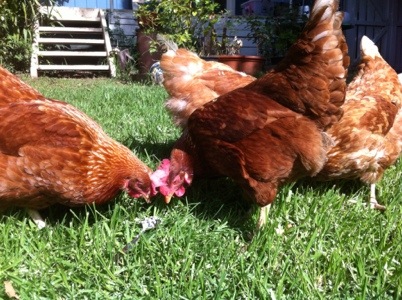
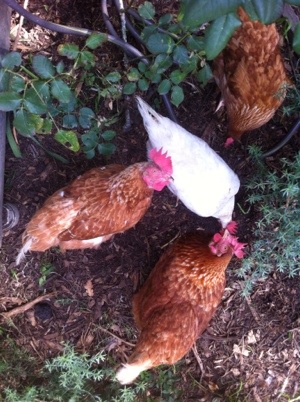
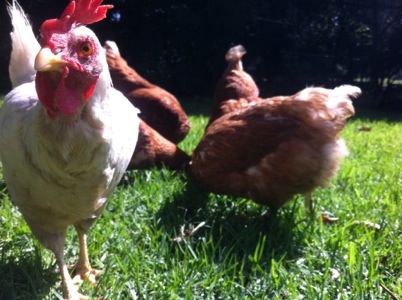
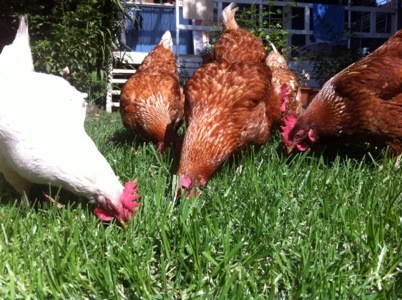
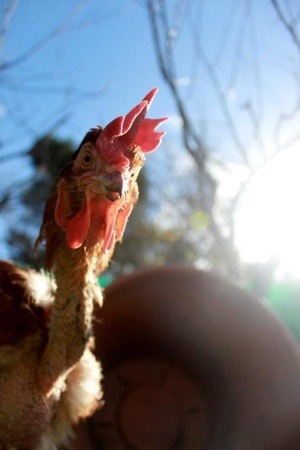
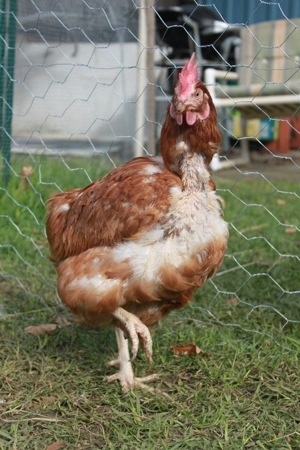
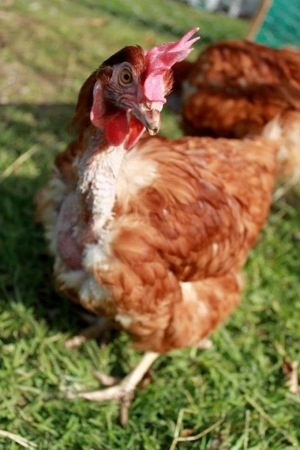
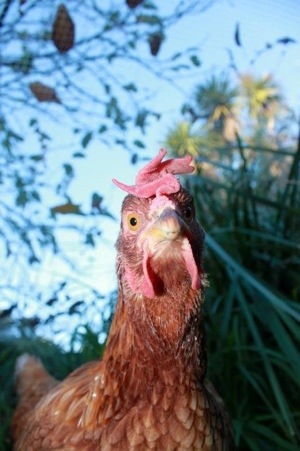
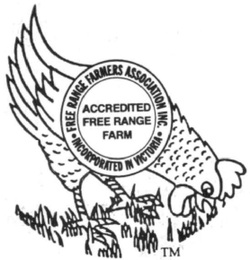
 Accredited organic eggs have a standard that they must adhere to. Here's an excerpt from the FRFA's website (see whole site here)
Preface – This document defines the FRFA Inc. accreditation requirements
Part A - HOUSING
1. Hens must have permanent access to weatherproof housing with either slatted, mesh or deep litter floors that contain sufficient perches to enable normal roosting for all birds.
2. Stocking density in housing shall not exceed 15 kg per square metre of useable area.
3. Maximum flock numbers per house shall not exceed 1,000 hens.
Part B - FEEDING
1. The use of growth promotants and hormones is not permitted.
2. Clean dry feed comprising only natural products, grains and natural sources of vitamins and minerals must be used. If meat by-products are included in the diet they must be heat treated. No manufactured colouring additives are be included in the feed.
Part C - FREE RANGE RUN.
1. The maximum stocking density must be sustainable and in any case not exceed 750 hens per hectare.
2. Hens must have unrestricted access to the free-range run during daylight hours. 3.The area where the hens are permitted to range shall have adequate shade/wind/predator protection and be capable of long-term sustainability with adequate natural ground cover. If vegetation disappears under adverse seasonal conditions then alternative natural range is to be implemented until ground cover can be re-established and/or supplementary green feed must be provided
Part D - HUSBANDRY PRACTICES.
1. All bird mutilation practices are unnecessary at the allowed stocking densities and are prohibited. (Beak trimming, etc)
2. Under extreme temperature conditions the hens must have access to cool drinking water and other “keep cool” types of environmental relief.
Part E - GENERAL REQUIREMENTS.
1. All accredited farms must be able to demonstrate compliance with all State and National regulations regarding egg collection, cleaning, candling, packaging, labelling, storage and transport. In particular, farms must comply with temperature and hygiene provisions of the Shell Egg Code and Food Safety Victoria.
2. Audit trail records are mandatory for all eggs stored, sold and/or interchanged between accredited farms. This association does not allow packaged/unpackaged hen eggs produced by other systems and unaccredited members to be brought onto, held or distributed by its accredited farms.
3. Age dated vaccination certificates are required to Victorian Regulations.
One brand that is readily available from Coles is Family Homestead free range eggs
Accredited organic eggs have a standard that they must adhere to. Here's an excerpt from the FRFA's website (see whole site here)
Preface – This document defines the FRFA Inc. accreditation requirements
Part A - HOUSING
1. Hens must have permanent access to weatherproof housing with either slatted, mesh or deep litter floors that contain sufficient perches to enable normal roosting for all birds.
2. Stocking density in housing shall not exceed 15 kg per square metre of useable area.
3. Maximum flock numbers per house shall not exceed 1,000 hens.
Part B - FEEDING
1. The use of growth promotants and hormones is not permitted.
2. Clean dry feed comprising only natural products, grains and natural sources of vitamins and minerals must be used. If meat by-products are included in the diet they must be heat treated. No manufactured colouring additives are be included in the feed.
Part C - FREE RANGE RUN.
1. The maximum stocking density must be sustainable and in any case not exceed 750 hens per hectare.
2. Hens must have unrestricted access to the free-range run during daylight hours. 3.The area where the hens are permitted to range shall have adequate shade/wind/predator protection and be capable of long-term sustainability with adequate natural ground cover. If vegetation disappears under adverse seasonal conditions then alternative natural range is to be implemented until ground cover can be re-established and/or supplementary green feed must be provided
Part D - HUSBANDRY PRACTICES.
1. All bird mutilation practices are unnecessary at the allowed stocking densities and are prohibited. (Beak trimming, etc)
2. Under extreme temperature conditions the hens must have access to cool drinking water and other “keep cool” types of environmental relief.
Part E - GENERAL REQUIREMENTS.
1. All accredited farms must be able to demonstrate compliance with all State and National regulations regarding egg collection, cleaning, candling, packaging, labelling, storage and transport. In particular, farms must comply with temperature and hygiene provisions of the Shell Egg Code and Food Safety Victoria.
2. Audit trail records are mandatory for all eggs stored, sold and/or interchanged between accredited farms. This association does not allow packaged/unpackaged hen eggs produced by other systems and unaccredited members to be brought onto, held or distributed by its accredited farms.
3. Age dated vaccination certificates are required to Victorian Regulations.
One brand that is readily available from Coles is Family Homestead free range eggs
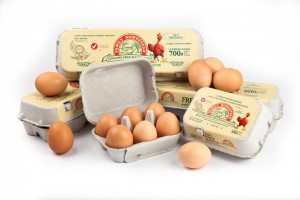 And another brand that is sold at my local markets and at my local healthfood store is Freeranger. Before I had my chooks these were the only eggs I would buy- I can vouch that they are fantastic eggs.
If hen welfare is not enough to convince you to put the extra effort into purchasing accredited organic and free range eggs, here are some interesting results from a study showing that pasture chooks lay eggs that are in fact better for you.
In short, it was found that eggs laid by hens who roam in pastures may have:
And another brand that is sold at my local markets and at my local healthfood store is Freeranger. Before I had my chooks these were the only eggs I would buy- I can vouch that they are fantastic eggs.
If hen welfare is not enough to convince you to put the extra effort into purchasing accredited organic and free range eggs, here are some interesting results from a study showing that pasture chooks lay eggs that are in fact better for you.
In short, it was found that eggs laid by hens who roam in pastures may have:
• 1/3 less cholesterol
• 1/4 less saturated fat
• 2/3 more vitamin A
• 2 times more omega-3 fatty acids
• 3 times more vitamin E
• 7 times more beta carotene
So, anyone out there have any other brands that they recommend? Or brands that they're not sure about? I'm happy to check them out 🙂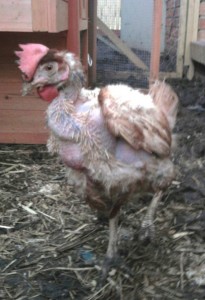
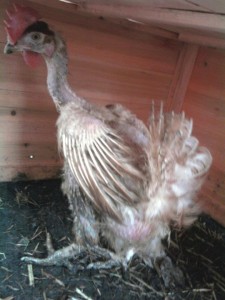 And after Sherrie's fantastic rehabbing work:
And after Sherrie's fantastic rehabbing work:
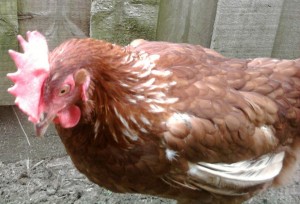
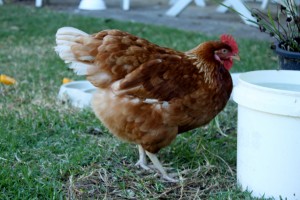 Every so often it would appear that she was straining - a classic sign of being egg bound. So I took her inside & gave her a warm bath for 20 minutes. While giving her a bath I massaged her abdomen gently and tried to feel for any egg that might be lodged. I couldn't feel anything so I was concerned that perhaps I misdiagnosed but I kept at it.
When I was done with the bath I popped her inside a mower box with a heat pad under a towel, as keeping an egg bound bird warm is vital. I made sure I put in a bowl of water in there in case she got too warm and put some liquid calcium in in case that would help her pass the egg.
In the morning I found this in the box:
Every so often it would appear that she was straining - a classic sign of being egg bound. So I took her inside & gave her a warm bath for 20 minutes. While giving her a bath I massaged her abdomen gently and tried to feel for any egg that might be lodged. I couldn't feel anything so I was concerned that perhaps I misdiagnosed but I kept at it.
When I was done with the bath I popped her inside a mower box with a heat pad under a towel, as keeping an egg bound bird warm is vital. I made sure I put in a bowl of water in there in case she got too warm and put some liquid calcium in in case that would help her pass the egg.
In the morning I found this in the box:
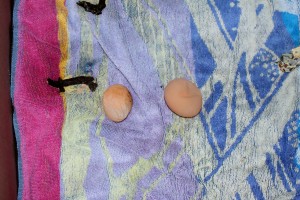 Two soft shelled eggs. Success! I then put her outside with the other girls and she's been fine all day.
Now to figure out why she's laying soft shelled eggs. My girls get calcium grit, high quality feed and they free range so in theory they should be fine. For the next few days I intend on putting calcium in one of their water bowls to try and fix things up, we'll see how that goes. Fingers crossed things with my girls are a bit quieter for at least the next few days!
In other chicken news, I did my first sticker run by putting some of these beauties up
Two soft shelled eggs. Success! I then put her outside with the other girls and she's been fine all day.
Now to figure out why she's laying soft shelled eggs. My girls get calcium grit, high quality feed and they free range so in theory they should be fine. For the next few days I intend on putting calcium in one of their water bowls to try and fix things up, we'll see how that goes. Fingers crossed things with my girls are a bit quieter for at least the next few days!
In other chicken news, I did my first sticker run by putting some of these beauties up
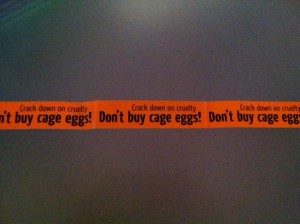 on the boxes that contained caged eggs at the local supermarkets. If it makes even one person reconsider buying caged eggs then it's been a success.
-Paula
on the boxes that contained caged eggs at the local supermarkets. If it makes even one person reconsider buying caged eggs then it's been a success.
-Paula
Recent Comments